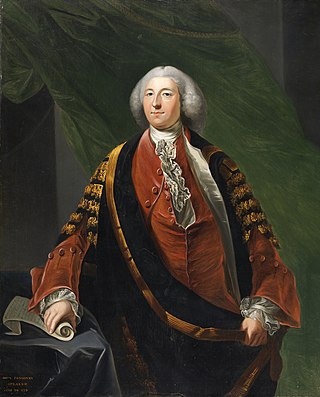Top Qs
Timeline
Chat
Perspective
John Ponsonby (politician)
Irish politician (1713–1787) From Wikipedia, the free encyclopedia
Remove ads
John Ponsonby, PC (Ire) (29 March 1713 – 16 August 1787) was an Anglo-Irish politician. He was Speaker of the Irish House of Commons between 1756 and 1771, a period in which the legislative independence of the Kingdom of Ireland was increasingly asserted and tested.
Remove ads
Early life
Ponsonby was the second son of Brabazon Ponsonby, who was created the Earl of Bessborough in 1739, and his first wife, Sarah Margetson Colvill.[1] He was the grandson of William Ponsonby, 1st Viscount Duncannon.[2] He was admitted to Trinity College Dublin on 6 April 1730, but there is no evidence that he ever graduated.[1]
Parliamentary career
Summarize
Perspective
In 1739, Ponsonby entered the Irish House of Commons for Newtownards and was soon aligned to his father's faction, which sought to reduce the influence of Henry Boyle. When Boyle resigned as speaker in 1756, Ponsonby was the only credible alternative and he was elected speaker unopposed.[1] He was re-elected to the chair in 1761 and 1769. He also served as First Commissioner of the Revenue and he became a member of the Privy Council of Ireland in 1746.[3] In 1761, Ponsonby was elected for County Kilkenny and Armagh, and sitting for the former. In 1768, he stood also for Gowran and Newtownards, and in 1776 for Carlow, but chose each time County Kilkenny, which he represented until 1783. Subsequently, Ponsonby was again returned for Newtownards and sat for this constituency until his death in 1787.[1]
Belonging to one of the great families which at this time monopolized the government of Ireland, Ponsonby was one of the principal "undertakers" – men who controlled the whole of the king's business in Ireland. Ponsonby ensured that he, as speaker, had direct input into the business of government. He employed patronage in the Commons to ensure that his supporters remained loyal and used his office to give credence to the growing Irish Patriot sentiment of the 1760s.[1] He retained the chief authority until George Townshend, 1st Marquess Townshend, became lord-lieutenant in 1767. Then followed a struggle for supremacy between the Ponsonby faction and the Dublin Castle administration party dependent on Townshend, which sought to implement a more assertive Irish executive aligned with London's interests.[1] In November 1769, Ponsonby voted in favour of a patriot motion rejecting a privy council money bill, prompting Townshend to dismiss him his role in the revenue. In 1770 he failed to respond to a proposal by Lord Charlemont to coordinate the opposition to Townshend. After Irish MPs voted to express their approval of the king's decision in 1771 to retain Townshend in office, Ponsonby impulsively resigned the speakership.[1][3]

Many of Ponsonby's former allies in the Commons chose to make their peace with the Irish administration, but Ponsonby himself remained in opposition. In 1776 he again stood for election as speaker, but was defeated by the popular incumbent, Edmund Sexton Pery. Ponsonby died, while still a member of parliament, on 16 August 1787.[1]
Remove ads
Marriage and issue
He married in 1743 Lady Elizabeth Cavendish, daughter of the 3rd Duke of Devonshire, a connection which was of great importance to the Ponsonbys.[3] His older brother, William Ponsonby, 2nd Earl of Bessborough, had married the Duke's eldest daughter in 1739. Ponsonby's sons, William Ponsonby, 1st Baron Ponsonby of Imokilly, and George Ponsonby, were also politicians of distinction. His daughter Catherine married Richard Boyle, 2nd Earl of Shannon, and was mother to Henry Boyle, 3rd Earl of Shannon.[2]
References
Wikiwand - on
Seamless Wikipedia browsing. On steroids.
Remove ads

